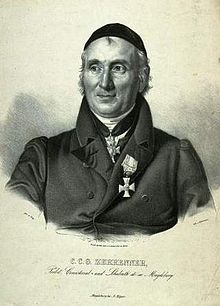Karl Christoph Gottlieb Zerrenner
Karl Christoph Gottlieb Zerrenner , also Carl Christoph Gottlieb Zerrenner (born May 15, 1780 in Beyendorf , † March 2, 1851 in Magdeburg ) was a German Protestant theologian , educator and writer. He earned special merit and international attention with the redesign of the school system in the city of Magdeburg.
Life
Zerrenner was born as the son of Heinrich Gottlieb Zerrenner and Katharina Zerrenner in the parish of Beyendorf . In his father's house, who also gave him his first lessons, well-known reformers, educators such as Basedow, von Rochow and Salzmann, frequented his home. From 1791 Zerrenner attended the pedagogy of the Berge monastery . From 1799 he studied theology like his father at the University of Halle , but also attended the educational lectures of August Hermann Niemeyer . In 1802 he initially worked as a private teacher before he got a position at the pedagogy of the monastery of Our Dear Women in the same year . As early as 1805, Zerrenner was appointed as a preacher at the Holy Spirit Church in Magdeburg. Here he was the second preacher after Johann Ernst Christian Blühdorn (1767–1842). In 1816 Zerrenner was appointed by the Prussian king alongside Johann Andreas Matthias (1761–1837) and Johann Friedrich Wilhelm Koch (1759–1831) to the consistorial and school council. When Mayor August Wilhelm Francke took office in 1817, a time of comprehensive reforms began in Magdeburg, which Zerrenner helped to determine in the school sector. Zerrenner, who as a member of the consistory was responsible for the supervision of the elementary school system in the Prussian province of Saxony , was also appointed city school inspector and head of the city school commission by Francke. Georg Friedrich Gerloff (1772–1842) and Johann Georg Christoph Neide were also active in this commission . During this time, Zerrener was now the first preacher at the Heiliggeistkirche and also head of the Sankt-Annen-Hospital and the Sankt-Gertraud-Kloster, he lived at Heiliggeiststrasse 4 .
Zerrenner designed a new Magdeburg school system, which he also implemented. There were several complementary school types, fixed curricula, equipment and teacher salaries. Compulsory school attendance was monitored and new schools were built. The freedom from school fees was introduced for elementary schools, and teaching materials were also available free of charge. At the same time, the religious school supervision was abolished. The school system was very modern for the time and received international attention.
He devoted particular attention to the training of teachers. In 1823 he took over the function of director of the royal school teacher seminar in Magdeburg and gave up his position as a preacher. In 1828, Zerrenner connected the seminar with an institution for the deaf and dumb in order to familiarize the trainee teachers with the teaching methods required there.
In 1831 Zerrenner was elected as successor to Gotthilf Sebastian Rötger as provost of the monastery of Our Dear Women and director of the monastery high school. In later years, Zerrenner's views increasingly came into conflict with state and city administrations. From 1840 his influence was increasingly curtailed. He was a member of the Magdeburg Freemason Lodge Ferdinand for happiness .
Works
Zerrenner wrote several practical textbooks and method books on the school system and continued to publish his father's "German School Friend " (volumes 47–60, Berlin, most recently Magdeburg 1812–23). In addition, he wrote 30 monographs and many essays. In 1838 he first published blackboards along with instructions for use in the classroom.
- The Westphälische Kinderfreund, a reading book for elementary schools , Halle: Kümmel 1811 ( digitized version )
- The new German child friend , Halle: Kümmel 1815 (2nd edition) ( digitized version )
- Brief message about the reorganized school system in Magdeburg , 1820
- Method book for elementary school teachers , 1820
- Principles of school education, school studies and teaching knowledge , 1824
- The new German child friend. Reader for middle and upper classes , 1830 ( digitized Theil 2, 3rd edition 1839 )
- The new German child friend. Reading book for elementary schools. Part 1 , Hallo: Kümmel 1831 (11th edition) ( digitized version )
- About the nature and value of mutual school facilities , Magdeburg 1832.
Honors
Zerrenner became an honorary citizen of Magdeburg in 1825 and was knight of the Red Eagle Order, 3rd class. In 1833 the University of Leipzig awarded him an honorary doctorate in philosophy and in 1834 the University of Halle an honorary doctorate in theology. In his honor, Magdeburg named a street as Zerrennerstraße .
literature
- Wolfgang Mayrhofer: Zerrenner, Carl Christoph Gottlieb. In: Guido Heinrich, Gunter Schandera (ed.): Magdeburg Biographical Lexicon 19th and 20th centuries. Biographical lexicon for the state capital Magdeburg and the districts of Bördekreis, Jerichower Land, Ohrekreis and Schönebeck. Scriptum, Magdeburg 2002, ISBN 3-933046-49-1 .
- Martin Wiehle : Magdeburg personalities. Published by the Magistrate of the City of Magdeburg, Department of Culture. imPuls Verlag, Magdeburg 1993, ISBN 3-910146-06-6 , p. 78.
- Ferdinand Sander: Zerrenner, Karl Christoph Gottlieb . In: Allgemeine Deutsche Biographie (ADB). Volume 45, Duncker & Humblot, Leipzig 1900, pp. 100-103.
- Hans Hermann Fries : Zerrenner, Carl Christoph Gottlieb. In: Biographisch-Bibliographisches Kirchenlexikon (BBKL). Volume 14, Bautz, Herzberg 1998, ISBN 3-88309-073-5 , Sp. 1576-1579.
Individual evidence
- ^ Address book of the city of Magdeburg, Magdeburg 1817, pages 53, 87, 96, 99, 106
- ↑ EF Liweh, address book of the city of Magdeburg , Magdeburg 1823, page 13, 35, 39, 43
| personal data | |
|---|---|
| SURNAME | Zerrenner, Karl Christoph Gottlieb |
| ALTERNATIVE NAMES | Zerrenner, Carl Christoph Gottlieb |
| BRIEF DESCRIPTION | German Protestant theologian, educator and writer |
| DATE OF BIRTH | May 15, 1780 |
| PLACE OF BIRTH | Beyendorf |
| DATE OF DEATH | March 2, 1851 |
| Place of death | Magdeburg |

